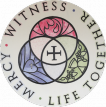12/8/2014 10:04:56 AM
2nd Sunday of Advent
Posted under: Advent
Second Sunday in Advent
December 7, 2014
In Nomine Jesu
John stood in the wilderness. He stood in a place of barrenness, of isolation, of emptiness. John stood in our world. The clock is of little significance to the shared sufferings of humanity that span the ages of our world. And yet the oasis’s we perceive are merely greater and greater mirages. For today the world has never been so crowded yet many are ever so lonely. Today we have never been so connected by social media yet many are ever so isolated. Today we travel to distant lands so effortlessly yet many go through life ever so aimlessly. Today we take in so much information, we see so much, yet many are ever so hopeless and blind. Today we speak ad nauseam about freedom yet we are ever so enslaved by our sin.
Out in this world John is “proclaiming a baptism of repentance for the forgiveness of sins” [Mark 1:4]. He holds nothing back. He tells you how it is. He tells you the truth even if it hurts. Yet his voice is drowned out by the noises of the world, outlawed by smug self righteousness, kept silent by the intoxication of progress and smothered by the fear of the truth. In the middle of your cozy winter wonderland the Lord sends forth His mouthpiece, His preacher, to voice His Word, to bulldoze your life, to crush every idol and prepare your body and heart for His highway that leads to the heavenly Zion.
But given to the world’s sensibilities and my own flesh, I don’t want to listen to John. It makes me angry that I must see and face my sins in his crying voice. It makes me sad and frustrated to hear his voice and know that I have hurt and scard those whom I love. I don’t want to be torn down. No wonder the world looks perplexed at the Lord who makes alive by killing. It’s no wonder that people view the Lord as too judgmental and too demanding. Yet one of the great questions of John the Baptist, of Advent is this: “Are we still capable of being truly shocked or whether it is to remain so that we see thousands of things and know that they should not be and must not be, and that we get hardened to them. How many things have we become used to in the course of the years, of the weeks and months, so that we stand unshocked, unstirred, inwardly unmoved” [Alfred Delp, Watch For the Light, 86].
The Advent voice of John the Baptist rouses us out of the stupor of our sins, out of the false and worldly idea that we can run from Him who is coming to judge the living and the dead. There is no use in running, even if you run faster than the last guy. Just ask Adam and Eve. Hang out with Jonah and Jeremiah. Sit with King David and Elijah, or chat with Peter and Paul. Read Psalm 139. “Where shall I go from your Spirit? Or where shall I flee from your presence? If I ascend to heaven, you are there! If I make my bed in Sheol, you are there! [138:7-8]. Just because you ignore something that exists doesn’t mean that it doesn’t exist. It likely means that you have been deceived into thinking that the truth is a lie and that the lie is the truth.
Beloved, the Lord’s call to repentance is not done out of spite, or glee, or as some divine schoolyard bully. He is not a wrecking ball swinging aimlessly at your heart and body. He is not destroying just to destroy. He is not punishing just to punish. He is not demolishing just to demolish. What you often forget and deny is that what you have inherited from your father Adam, what you have built with your hands and inherited from your neighbor is passing away, is given to this world only, and is given to destruction. The Lord’s work of repentance is His strange yet necessary work of getting you to see that whatever you are protecting is unprotectable. What the Lord builds in the place of your ruinous life that lies in dust and ashes, what He builds in His Son the Christ, in His Baptism and in His Supper, will be given and is already given to the age which is to come. Isaiah was long before John’s time, but he heralded the same note: “All flesh is grass, and all its beauty is like the flower of the field. The grass withers, the flower fades when the breath of the Lord blows on it; surely the people are grass. The grass withers, the flower fades, but the word of our God will stand forever” [Isaiah 40:7-8].
The things we hold closest to our chest are the hardest things to let go. Sometimes these things stand as roadblocks in the highway to God’s gifts of righteousness, of contentment, of peace. Our pride, our desperate need for approval, our stubborn denial that anything is wrong, and our fear of losing what ever little we have left. The Lord knows that your holding on to grass and flowers is like trying to hold on to sand or water in the cup of your hand. Brutally or gently it will go away. But one thing endures forever. One thing will not slip from your hand or from your ear or heart: It is spoken from age to age and even in the age to come: His Word, His Promise. Though you faint in the heart of your sins and death entombs you, His Word abides in You, for you, and it restores and resurrects you in the life of the Son, coming with righteousness and salvation.
The Lord has a heart. He does not desire the death of the sinner. He sees you in the wilderness, lonely, desperate, confessing your sins. The advent of His grace comes in the Mighty One, the One who is greater than all but becomes lower than all, who stoops down into your lonely, desperate and sinful life and baptizes Himself with your sins, taking them into His Body, into His Spirit, and washing them away in His death and His resurrecting life. The infant holy, infant lowly ends your warfare with yourself and your sins, with your hell and your death.
The illusions and the mirages, the lies and the empty promises of the wilderness will continue to try and tear you away from the Word of God. The devil will make sure of it. But the Word of God did not come from the hollow empire of Tiberius, the mirage of Pontius Pilate’s Power, and the illusion that Herod could kill the infant priest. The hope and promise of God comes into the wilderness through voice of John, through the water and the flesh of the coming One, the Christ. So be baptized. And if you already are, return to your Baptism. Eat His Supper. And if you already have, return to its plentiful oasis, it is no mirage, its eternal food of peace and pardon. Through the water, blood, and Spirit of the Mightier One, you have the promise that brings to you the gifts of a world not yet, but is, a world that awaits you, yet you already inhabit as citizens through this water and this blood.
In the Name of the Father, and of the Son [+] and of the Holy Spirit. Amen.


